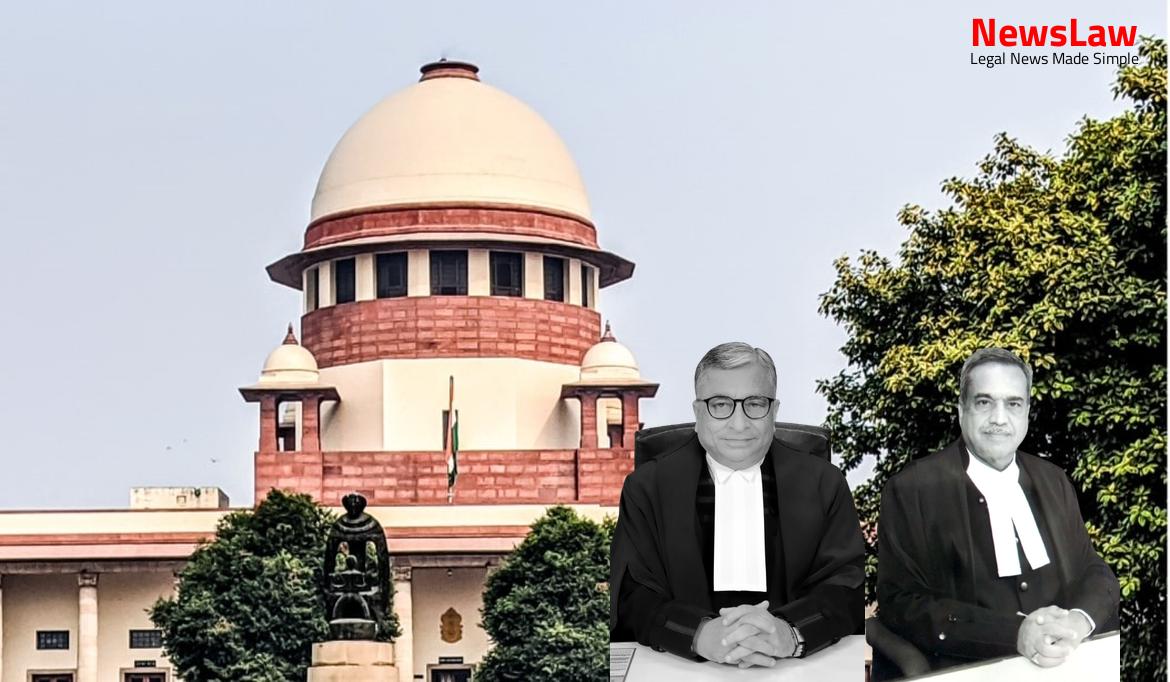In a recent landmark judgment by the Supreme Court of India, the issue of specific performance in a land dispute case involving Mohinder Kaur and Bahadur Singh was resolved. Despite possessing the land for 13 years, Bahadur Singh failed to pay rent as per the agreement with Mohinder Kaur. This failure to fulfill an essential promise led to the dismissal of the suit for specific performance, highlighting the importance of contractual obligations in property transactions.
Facts
- Mohinder Kaur entered into an agreement with Bahadur Singh to sell the suit land for Rs.5605.
- Litigation regarding the property was to be resolved before executing the sale deed.
- Possession of the land was given to Bahadur Singh on the date of the agreement to sell.
- The litigation was not resolved until 13 years after the agreement was made.
- Rs.1000 was paid as earnest money at the time of the agreement.
- Bahadur Singh requested Mohinder Kaur to execute the sale deed but she failed to do so.
- Bahadur Singh filed a suit for specific performance of the agreement.
Also Read: Enforcement of Foreign Award: Case of Oscar Investments Limited and RHC Holding Private Limited
Issue
- Defendant raised plea that Bahadur Singh did not pay the rent as per agreement
- The issue is whether Bahadur Singh is entitled to specific performance despite not paying rent
- Court to determine if failure to pay rent is a valid ground to deny specific performance
Also Read: NGOs Substantial Financing Case: Supreme Court’s Judgment on Public Authority Definition
Arguments
- The question of law in the appeals is whether a vendee failing to fulfill a promise in a contract can seek specific performance of that contract.
- The respondents’ counsel argued that if the plaintiff did not pay rent, the appropriate recourse was to file a suit for rent recovery.
Also Read: Maintenance Rights of Divorced Women: Reconsideration Plea by Mr. Debal Banerjee
Analysis
- The agreement contained several promises which may be reciprocal, contingent, or separate.
- Section 51 of the Contract Act states that for contracts with reciprocal promises to be simultaneously performed, no promisor needs to perform unless the promisee is ready and willing to perform.
- Section 16(c) of The Specific Relief Act requires proof of performance or readiness to perform essential contract terms before enforcing specific performance.
- Specific performance of a contract is discretionary per Section 20 of The Specific Relief Act.
- Bahadur Singh did not pay rent for 13 years, causing undue hardship to Mohinder Kaur, the vendor.
- The discretionary relief of specific performance cannot be claimed if a party fails to perform their part of the contract.
- Court’s discretion in granting relief is not bound by party’s legality but considers equity and fairness.
- Hardship at the time of contracting is a factor in exercising discretionary relief per Explanation (2) of Section 20.
- Bahadur Singh’s non-payment of rent despite possession of the land was a failure to perform an essential term of the contract.
- The reciprocal promise of paying rent was vital to the agreement to sell, making it an essential part of the contract.
- The plaintiff’s failure to prove readiness or willingness to perform essential terms, like paying rent, hinders the enforcement of specific performance.
- The discretionary nature of specific performance is vital for immovable property contracts per Section 20 of The Specific Relief Act.
- Failure to pay rent led to forfeiture of right to specific performance
- Enjoyment of land for 55 years without paying rent disqualifies from any relief
- No costs ordered
Decision
- The appeals were allowed
- The judgment and decree of all the courts below were set aside
- The suit for specific performance was dismissed
Case Title: SURINDER KAUR (D) TR.LR. Vs. BAHADUR SINGH(D) TR.LRS.
Case Number: C.A. No.-007424-007425 / 2011



